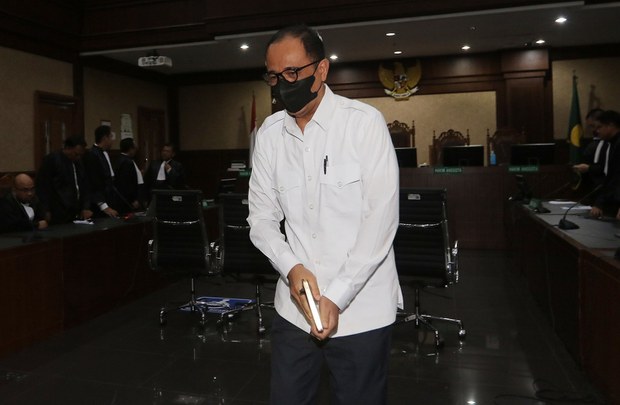Ex-Indonesian tax official gets 14 years in prison for graft, money laundering
2024.01.08
Jakarta
 Former Indonesia tax official Rafael Alun Trisambodo prepares to leave the anti-corruption courtroom in Jakarta after being sentenced to 14 years following his conviction on corruption charges, Jan. 8, 2024.
Former Indonesia tax official Rafael Alun Trisambodo prepares to leave the anti-corruption courtroom in Jakarta after being sentenced to 14 years following his conviction on corruption charges, Jan. 8, 2024.
An Indonesian court convicted and sentenced a former tax official on Monday to 14 years in prison for corruption in a case that angered the public last year and set in motion a scrutiny of other taxmen with suspiciously large assets.
The Jakarta anti-corruption court ruled that Rafael Alun Trisambodo could face three additional years in prison if he does not pay 10.7 billion rupiah (U.S. $690,000) in damages following his conviction on graft and money laundering charges. The figure is about that same amount the judges said he accepted in kickbacks from taxpayers between 2002 and 2013.
“The defendant has been found guilty of corruption,” Chief Judge Suparman Nyompa said in announcing the panel’s verdict.
The court determined Rafael had transferred money to bank accounts and properties under his and his relatives’ names to conceal the funds’ origin.
The scandal erupted in February 2023 after a video of Rafael’s son, Mario Dandy Satriyo, and his friends assaulting a 17-year-old boy in a Jakarta alley went viral on social media, triggering public outrage. The boy suffered severe head injuries and was in a coma for weeks.
In September 2023, Mario was sentenced to 12 years in prison for the attack.
The incident exposed the lavish lifestyle of Rafael and his family, raising suspicions about the source of wealth. Internet users dug up photos and videos of Mario flaunting luxury cars and motorcycles on his Instagram account, which contrasted with his father’s modest salary as a civil servant.
In Indonesia, high-ranking civil servants receive a monthly salary of about $2,500 including benefits.
The anti-graft commission launched an investigation and found that Rafael had accumulated more than 56 billion rupiah ($3.6 million) in assets, including properties, vehicles and bank accounts. He was suspended and later fired from his job before being arrested in May 2023.
Rafael has denied any wrongdoing and said he was considering an appeal. He claimed that his wealth came from legitimate sources such as inheritance, business and investments.
He also apologized for his son’s actions and asked for public forgiveness.
Last year, Mohammad Mahfud MD, Indonesia’s security minister, revealed discovering U.S. $23.3 billion (361 trillion rupiah) in allegedly suspicious transactions over the last 14 years within the finance ministry.
The suspicious transactions allegedly involved tax evasion, money laundering and smuggling, including $13 billion (201.5 trillion rupiah) linked to the alleged smuggling of gold, according to Mahfud.
Also last year, Finance Minister Sri Mulyani Indrawati said the ministry’s staff members were not involved in money laundering or corruption schemes linked to the suspicious transactions.
She said the transactions flagged by the anti-graft agency were valued at 3.3 trillion rupiah ($212.9 million).
Corruption perception
Amid public angst about these scandals, President Joko “Jokowi” Widodo urged parliament to deliberate a bill to allow the government to seize assets linked to crimes such as corruption and money laundering.
The bill was submitted by the executive branch to the House of Representatives in 2020 but has not been debated by lawmakers.
Indonesia ranked 110th of 180 countries in Transparency International’s 2022 Corruption Perception Index. The country has struggled with longstanding corruption as government officials often allegedly ask for bribes to speed up projects and approve permits, the most recent report found.
Jokowi, who will leave office later this year following next month’s general election for his successor, had pledged to fight corruption and improve governance as part of his agenda to attract foreign investment and boost economic growth.
However, critics have said that corruption remains endemic and systemic in Indonesia, and pointed to the weakening of the Corruption Eradication Commission under a controversial law passed in 2019.







